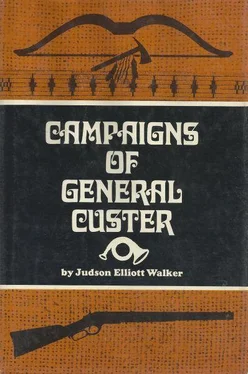Walker Array - Campaigns of General Custer in the North-west, and the final surrender of Sitting Bull
Здесь есть возможность читать онлайн «Walker Array - Campaigns of General Custer in the North-west, and the final surrender of Sitting Bull» весь текст электронной книги совершенно бесплатно (целиком полную версию без сокращений). В некоторых случаях можно слушать аудио, скачать через торрент в формате fb2 и присутствует краткое содержание. Жанр: Историческая проза, Исторические приключения, Приключения про индейцев, на английском языке. Описание произведения, (предисловие) а так же отзывы посетителей доступны на портале библиотеки ЛибКат.
- Название:Campaigns of General Custer in the North-west, and the final surrender of Sitting Bull
- Автор:
- Жанр:
- Год:неизвестен
- ISBN:нет данных
- Рейтинг книги:5 / 5. Голосов: 1
-
Избранное:Добавить в избранное
- Отзывы:
-
Ваша оценка:
- 100
- 1
- 2
- 3
- 4
- 5
Campaigns of General Custer in the North-west, and the final surrender of Sitting Bull: краткое содержание, описание и аннотация
Предлагаем к чтению аннотацию, описание, краткое содержание или предисловие (зависит от того, что написал сам автор книги «Campaigns of General Custer in the North-west, and the final surrender of Sitting Bull»). Если вы не нашли необходимую информацию о книге — напишите в комментариях, мы постараемся отыскать её.
Campaigns of General Custer in the North-west, and the final surrender of Sitting Bull — читать онлайн бесплатно полную книгу (весь текст) целиком
Ниже представлен текст книги, разбитый по страницам. Система сохранения места последней прочитанной страницы, позволяет с удобством читать онлайн бесплатно книгу «Campaigns of General Custer in the North-west, and the final surrender of Sitting Bull», без необходимости каждый раз заново искать на чём Вы остановились. Поставьте закладку, и сможете в любой момент перейти на страницу, на которой закончили чтение.
Интервал:
Закладка:
This party encountered hostile Indians near the Yellowstone, and on August 4th, several companies of the 7th Cavalry, under Custer, had a sharp engagement with a body of Sioux, under Sitting Bull, resulting in the loss of one soldier, surprised at a spring, the wounding of Lieutenant Bra-den, and the murder of Dr. Houtzinger, veterinary surgeon, and Mr. Baliran, sutler of the 7th Cavalry-they being unarmed, detached from the main body, and unsuspicious of danger.
The expedition returned to Fort Rice during the latter part of September-the engineers having fully completed their explorations, and mapped out in detail the future course of the road.
As may well be imagined, these frequent invasions of their territory by armed troops, awakened the most bitter resentment in the breasts of the hostile Indians, and when, in 1874, in obedience to the demands of the press, that the territory of the Black Hills should be explored and opened to settlement, it was decided by the Government to send an exploring expedition of armed troops into that hitherto unknown stronghold of the savages, the seal was set upon the crowning act of its long series of annually-broken faith.
It had long been matter of popular belief in the northwest that gold existed in the Black Hills, and when, at last, the truth of these hitherto vague reports was established to a Certainty in many adventurous minds, the excitement became contagious, and parties of miners began to organize for the invasion of the Hills. Then it was determined by the Government to send a strong column of troops to thoroughly explore the Black Hills, and ascertain, through official research, the truth or falsity of these golden rumors.
Accordingly, July 1st, 1874, a force under Lieutenant-Colonel Custer, comprising cavalry, infantry, four Gatling guns, and sixty Indian scouts-1,200 strong-and accompanied by a huge wagon-train of provisions and baggage, left Fort Lincoln and took up the line of march for the Black Hills. The party proceeded without molestation by Indians, although many hostiles were seen along the route. The discoveries of this expedition were such as to satisfy the most skeptical in regard to the mineral and agricultural wealth of the Black Hills region. Miners and other resolute pioneers began to pour into the country.
The scientists, however, were not yet satisfied, and to quiet the learned disputes of the self-constituted geologists of the period, a second expedition, under direction of Professor Jenney, with military escort commanded by Colonel Dodge, 9th Infantry, was sent from Fort Laramie the following year -1875.
Their report, corroborative of the report of the expedition of the preceding year, was not required to convince the hardy western pioneers of the desirability of the Hills a› amp; a place of residence. They required no encouragement in the shape of Government explorations, to brave the dangers of the trip, and to press in and occupy the land.
Then it was that the Government awoke to a realization of the consequences likely to flow from its frequent violation of treaty obligations. A general war between the settlers and the Indians seemed imminent, if, indeed, an indiscriminate massacre of the former did not ensue. Every trail leading to the Black Hills was marked with bloodshed, and safety was found only in the interior of the Hills, where the superstition of the Indians did not allow them to penetrate. Then, too late, began the efforts of the Government to repair the wrong. An order was issued, warning the settlers to leave the Hills. Several times during the summer of 1875, the troops under General Crook were sent into the Hills to maintain the faith of the Government by removing the settlers from the territory. They were conveyed out of the country by military escort, imprisoned in military posts as breakers of the law, their property destroyed, and themselves finally turned over to civil authority, to be punished for disobedience of the orders of the Federal Government. But all to no avail. Popular sympathy in the west was with them. Soon as released they invariably returned to the disputed territory, only to be again removed, and to again return. In August, 1875, there were six hundred men in one locality, called " Custer City," and many others in different localities. When removed by military authority, these speedily returned, and the efforts of the Government to repair its broken faith, by removing and keeping out white settlers, were as futile as the military invasions of the country, under its sanction and direction, had been successful.
So much for the causes that led to the breaking out of the war on the part of the Sioux.
We are now to consider the relations of the chief actor in the tragedy in which it closed-George A. Custer, Lieutenant-Colonel of the 7th Cavalry-with a leader of the hostiles, who fired the shot that terminated his life, in the battle of the Little Big Horn, and thus gratified the vengeance for which he and his followers had long waited in the mountain fastnesses of Sitting Bull's domain. Some of the incidents we are about to relate may seem trivial and unimportant, but they were all links in the chain of destiny that was drawing the "long-haired chieftain" irresistibly toward his tragic fate.
One bright morning in the spring of 1875 the peaceful citizens of a quiet little town on the Missouri Eiver, in Dakota Territory, were immeasurably astonished to witness a company of the 7th Cavalry, ucder command of Lieutenant-Colonel G. A. Custer, come riding up their streets, fully armed and equipped as if for instant action. Nor was their surprise lessened when it became known that the object of the warlike display was nothing more nor less than * the capture of sundry bags of grain that had been stolen from the Government warehouses at Fort Lincoln by the soldiers and citizen thieves, and sold to sundry citizens of the town. After the capture of the bags of grain was successfully effected, and loaded on army wagons, and, taking with them several persons who had been concerned in the illegal transfer of Government property, the train returned in good order to Fort Lincoln.
CHAPTEE II.
The Grain Thieves and Bain-in-the-Face. – The Unrelenting
Warrior.
To make the record more complete in regard to army matters, and more especially in relation to the troubles and torments too often inflicted upon officers of high rank in the regular army, the writer will here introduce circumstances with relation to certain current events as they transpired, in order to more clearly and pointedly illustrate to the reader how General Custer, while in command at different stations, as well as other officers of high rank in the regular army at the present day, whose moral training having been good, and always with an eye to good discipline and the morale of their respective commands, also army society and communities
in civil life are compelled not only to accept the presence, but to a certain extent, the services of unprincipled and profligate scapegoats, who, by accident, hold their positions either by commission or special appointment, not only to the horrid disgust, but to the actual disgrace and discredit of our worthy professional army officers and their families, as well as to all civilized and well-regulated communities who are at times compelled to accept the services of, whenever enforced upon them, a certain immoral and wretched class of imported floating spawn, that hold positions by accident.
General Custer, in his well-meant efforts to preserve the morale of the rank and file of his command, and to enforce good order and discipline throughout the garrison at which he was stationed, did not escape the annoyances, or avoid the obstacles usually encountered by United States army officers of high rank in similar measures of reform.
Not the least difficulty in the way of success in such efforts, is found in the character, or rather the lack of character, of many of their subordinate officers; and this is due to the appointments from civil life, made after the close of the war, by congressmen of a certain class, who, for a time, regarded the army as an asylum for their poor relatives and distressed constituents, many of whom were wholly unfit for their positions, both on account of utter incompetency and intemperate habits. This class of appointments having been forced upon the army by unprincipled politicians, tended greatly to reduce the morale of the army and to lower the standard of social life in army circles, and rendered also much more difficult the task of commanding officers in enforcing discipline and orderly behavior in their respective commands.
Читать дальшеИнтервал:
Закладка:
Похожие книги на «Campaigns of General Custer in the North-west, and the final surrender of Sitting Bull»
Представляем Вашему вниманию похожие книги на «Campaigns of General Custer in the North-west, and the final surrender of Sitting Bull» списком для выбора. Мы отобрали схожую по названию и смыслу литературу в надежде предоставить читателям больше вариантов отыскать новые, интересные, ещё непрочитанные произведения.
Обсуждение, отзывы о книге «Campaigns of General Custer in the North-west, and the final surrender of Sitting Bull» и просто собственные мнения читателей. Оставьте ваши комментарии, напишите, что Вы думаете о произведении, его смысле или главных героях. Укажите что конкретно понравилось, а что нет, и почему Вы так считаете.












